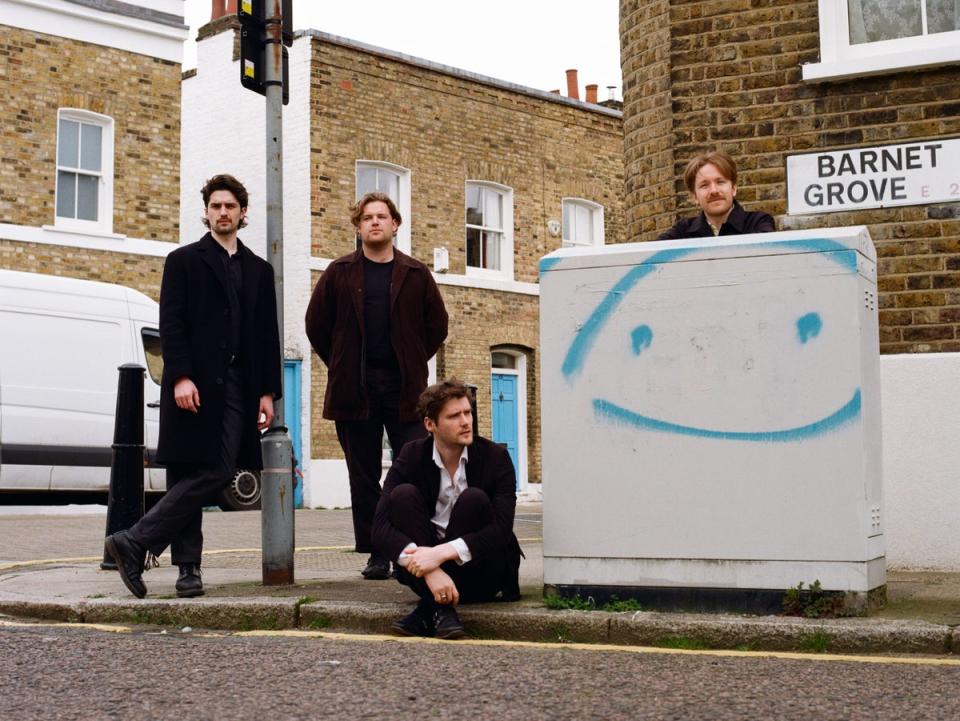Do Nothing on anxiety, existentialism and making a debut: ‘If you’re meant to be writing an album and you can’t, you go into doom mode’

When I was a kid, the thing I wanted to do the most was make an album,” says Do Nothing’s vocalist Chris Bailey when we meet at his local cafe. It’s a wet, muggy day in Nottingham. We’re seated on a damp bench among some brazen pigeons. On paper, Bailey, 28, has everything he’d hoped for – but as the adage goes, all that glitters isn’t gold. “You get so jaded with each level that you go up, that you end up holding the record you made and feeling nothing.”
The Nottingham four-piece, completed by Kasper Sandstrøm (guitar), Charlie Howarth (bass) and Andy Harrison (drums), first arrived on the scene with their Maccabees-esque “Handshakes” in 2018. Then came two elegant EPs (2020’s Zero Dollar Bill and 2021’s Glueland EP), in which Bailey’s distinctive, supple vocals spearhead moody melodies. These are swarmed with warm and wonky post-punk. The band, who’ve “known each other for forever and ever,” are influenced by everyone from Tom Waits to Texan band Spoon and (Bailey’s favourite) Simon and Garfunkel. It all feeds into the band’s long-awaited debut album, Snake Sideways, a graceful and refined 10-track showpiece of detailed melancholia. The album might sound seamless, but the process was not. “I’m not going to dress it up, today didn’t go so well,” sings Bailey in the band’s first single in two years, “Happy Feet”. “That’s kind of how every day was,” he tells me. “It was a huge amount of stress.”
Pressure to create often stifles creation. This was the case for Bailey, who got so stuck in the writing process that he fell into an anxiety rabbit hole. Nearly all the tracks on the record were written during this “super terrible time”. Music, he says, “became not a fun or healthy thing. It became a nightmarish bit of work.” For a while, his self-worth had been twisted up with his vocation. “If the whole idea of my identity is wrapped up in being in this band – and I’m meant to be writing the album and I can’t – you go into doom mode.” He tugs a little uncomfortably from his vape. “I was like, OK, so the band’s gonna end because the album is never going to come out. And then what?” Even now, you can hear the hangover of fear in his voice. “You get used to the idea of being a person in a band and then without that and you just have to be a f***ing person” – he laughs a little self-consciously – “and I don’t know how to do that!” The singer knew how lucky he was to be making an album in the first place – which made it worse. “I was [telling myself to] f***ing grow up,” he says. “It’s a whole f***ing loop that is impossible to get out of.”
Bailey’s turning point came when he realised he could put his self-doubt into the album itself. “The record became about that – not just that – but a certain ‘Jesus Christ panic’ headspace,” he says. With that, music no longer felt like a storm but a place of solace, somewhere he could release his worries into the wild. That said, Bailey was conscious not to make the record a “40-minute whinge” about his not-so-hard life. “It’s about trying to get back into a headspace where you’re appreciative of things that you’ve wanted for ages,” he says of the debut.

The shift allowed Bailey to experiment with new ways of writing. He started to work on the piano, an instrument he “can’t technically play”. “It’s just a way of breaking out of a certain cycle,” he says. “You don’t know where you’re supposed to go, so you just feel it out.” Post-punk is still in the record’s “genetic framework” but as a whole, the album’s despondent themes have made room for more subtle and intricate melodies. Parts of the record look Bailey’s fears in the eye. “They’re gonna fire you in the morning,” he speculates on the tender opening track, “Nerve”. (“I wouldn’t tell anybody anything,” he says when I ask how his bandmates responded to his anxiety. “They were definitely as supportive as I allowed them to be.”) It’s Bailey’s most personal lyricism to date – but, as is his signature style, his inner thoughts are disguised behind the guise of others. It’s universal suffering. “The point is to express something very specific and personal about myself, but for that to give somebody something that they can jump inside of,” he says of his process, admitting that “it’s also probably a bit of being evasive and not being brave enough to look something in the face”.
Inevitably with the debut’s release, Bailey has had to engage in self-promotion. “We’re now in the part of the cycle where you have to talk about [the writing process]. I have to think about it and be like, what actually was going on?” he says. “When you write an album and promote it, you’re sort of trying to lift it up by being like, ‘We made this crazy thing and you should buy it’. You want people to think that it’s like a confident piece of work, but that’s not necessarily true. It’s a very stressy f***ing record – and it got f***ing dark. I wanted to be clear about that and not avoid it”. It’s rare to hear such a brutally honest experience of a glamourised music industry – and despite the record’s unashamed dark side, it carries a defiant message of hope. “I know when I listen back to it, I’ll be able to be confident that the songs came from a very honest space,” he says. “It’s being in a tough spot and trying to see a way out of it.”
Do Nothing’s debut album ‘Snake Sideways’ is out now

